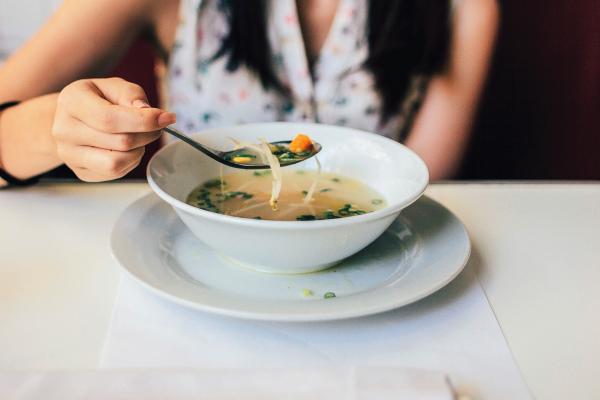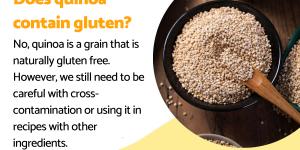How to Know if Soup is Spoiled


We've all been there: you cook a delicious pot of soup, only to realize later it's been left out on the counter all night. Now you're wondering if it's still okay to eat. While most foods have clear expiration dates, soup can be tricky. The good news is, with a little checking, you can decide if your leftover soup is still good to enjoy or if it's time to throw it out.
Here at OneHOWTO, we'll explore how to know if soup is safe to eat and how you can preserve it for longer.
How to know if my soup is spoiled?
Leftover soup can be a delicious and convenient meal, but knowing when it's past its prime is crucial to avoid foodborne illness. Here are the important factors to consider when evaluating the safety of your soup:
- Fresh soup maintains its original color. Watch out for discoloration or mold growth, which signify spoilage.
- A clear soup shouldn't have cloudiness or unexpected sediment at the bottom.
- Fresh soup has a pleasant aroma associated with its ingredients. A sour or off-putting odor suggests spoilage.
- Bulging or leaking cans or containers indicate gas buildup from bacterial growth, suggesting spoilage. Dents can also compromise container integrity and allow bacteria entry.
- Rusted or swollen opened cans might harbor harmful botulinum toxin. Discard them immediately (but boil for 30 minutes first to decontaminate).
- Proper storage is essential. Leftover soup should be refrigerated below 40°F (4°C) within two hours of cooking to minimize bacterial growth. Leaving it out for extended periods increases spoilage risk. For large batches, dividing soup into smaller containers before refrigeration facilitates faster cooling, further hindering bacterial growth.
- Opened canned soup typically lasts 4-5 days in the refrigerator. Freshly made soup can last around 6 days refrigerated. Home-canned soup generally keeps for a year in the pantry, while commercially soup can last 2-5 years. Frozen soup remains safe indefinitely at 0°F (-18°C).
- Tasting is a last resort. If the soup looks, smells good, and has been properly stored, a small taste is acceptable. It shouldn't taste sour, rancid, or unpleasant. Discard the soup if it has any off-flavors.
When in doubt, throw it out. Foodborne illness can be serious. This guide empowers you to make informed decisions about the safety of your leftover soup.
Can you reboil soup to kill bacteria?
Re-boiling soup can effectively kill some bacteria like salmonella and E. coli, which are common causes of foodborne illness. However, it's crucial to note that certain bacteria, such as those that cause botulism, can form spores that survive boiling. These spores may remain inactive during re-boiling but can start to multiply once the soup cools down again. Also, reboiling can destroy some bacteria that may have gone dormant during refrigeration.
To ensure safety, re-boiling soup for at least 10 minutes can also help inactivate botulism toxin. If soup has been left out overnight and is then re-boiled and promptly refrigerated, it can generally be considered safe for consumption because the initial cooling likely did not allow bacteria to germinate and multiply.
However, if soup has been left unrefrigerated for more than 3 days, it may have accumulated harmful bacteria like Bacillus cereus or Clostridium perfringens, along with potentially high levels of toxins. Re-boiling this type of soup can kill the bacteria but may also affect its taste, flavor, and smell due to the presence of dead bacteria and inactivated toxins.

What temperature can you keep soup at?
Most people are aware that refrigeration helps keep food safe, but knowing the correct temperature for storing your food is crucial. Refrigerators have varying temperature ranges, and using a refrigerator thermometer can help you monitor and maintain the ideal temperature, ideally around 4°C or 40°F, for a maximum of 4 days.
While refrigerators are essential for food safety, many users may not realize the importance of maintaining the correct temperature to prevent bacterial growth and spoilage. While a healthy individual may consume soup left out overnight without refrigeration, those with compromised immune systems are at higher risk of illness from consuming soup that has been left unrefrigerated. To mitigate risks, it's advisable to re-boil soup for 10 minutes to eliminate any bacteria present. It is recommended to discard any soup left unrefrigerated for more than 4 days to ensure safety.
The longer soup is held at a particular temperature, the higher the risk of bacterial growth. It's best to serve hot soup as soon as possible and refrigerate leftovers promptly. Never leave soup out at room temperature for more than 2 hours, regardless of its initial temperature.
Also, cream-based soups or those containing dairy products might have a slightly shorter safe holding time at hot temperatures compared to broth-based soups.
Wondering if that forgotten pack of ground beef is still safe to use? Learn how to identify signs of spoilage in different types of meat in our follow-up article.
Can you freeze soup?
Most soups, including broth-based, creamy, and vegetable soups, freeze well. However, soups with a high starch content, like corn chowder or thick potato soups, might lose some texture upon thawing. Here are some tips to freeze and preserve your soup correctly:
- Always allow soup to cool completely to room temperature before freezing. Hot liquids can crack containers and compromise freezer efficiency.
- Consider freezing soup in individual serving sizes or smaller containers for easier thawing and portion control.
- Don't fill containers to the brim. Leave about an inch of headspace at the top to allow for soup expansion during freezing.
- Use airtight, freezer-safe containers or freezer bags to prevent freezer burn and ensure food safety.
Properly frozen soup can maintain its quality for several months, with broth-based varieties lasting the longest at up to 6 months. Creamy soups and soups with vegetables will generally be good for up to 3 months.
Remember to always label frozen soup containers with the date to keep track of how long it's been frozen.
Not everything freezes well! Unsure if your favorite foods can handle the cold? Discover which ingredients to keep fresh and which to freeze with our guide to freezer-friendly foods.
If you want to read similar articles to How to Know if Soup is Spoiled, we recommend you visit our Food & drink category.






